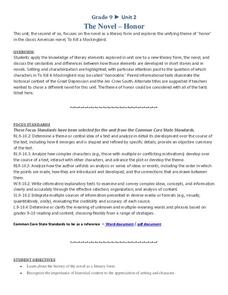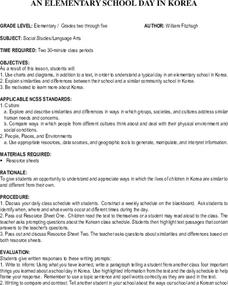Curated OER
Sequence, Predict, Infer: Pink and Say
Practice sequencing with your 2nd graders via Patricia Polacco's Civil War book Pink and Say. Begin with a blindfold and a bag of mystery items. Connect their use of clues to identify what they can't see with the skill of making...
Curated OER
Comparing Cinderella and The Rough-Face Girl
Pupils examine similarities and differences between cultures. They'll see that literature, reading, and story telling is something all cultures have in common. They should construct Venn diagrams to help them compare and contrast the...
Curated OER
School Life Today and in the Past at Freyberger School
Students compare and contrast school life today with that of Pennsylvania in the 1900's. In this school life lesson plan students create a description of a typical one-room schoolhouse. They think critically about attending school in a...
Curated OER
Literature Circles
Fourth graders work in groups in order to motivate one another to develop reading comprehension and literacy skills. The skills are built through the sharing of fine literature. They maintain a reading log to keep accountable for the...
Curated OER
Ten Prompts for Student Writing
Build writing skills and creative thinking. Writers are given a variety of thought-provoking writing prompts to choose from. After they choose what they will write about they share their pieces with the class.
Curated OER
Number Line Snacks: Compare Numbers to 10
Kindergarteners put Cheerios or cheddar fish on two number lines (up to 10 each) and identify which number the snack pieces indicate. They compare numbers after eating a few of each snack, and get an introduction to addition and...
Curated OER
8th Grade Writing - Motivation, Organization and Emotion
Using relevant, current events with historic literature makes for great writing.
University of Kansas
Newspaper in the Classroom
Newspapers aren't only for reading—they're for learning skills, too! A journalism unit provides three lessons each for primary, intermediate, and secondary grades. Lessons include objectives, materials, vocabulary, and procedure, and...
Curated OER
Harnessing the Olympic Spirit
Use the energy and excitement of the 2014 Winter Olympics to motivate your class to research and write.
Curated OER
Pre-Columbian Cultures in the Americas
Native American studies is fun, educational, and highly motivating. Fifth graders will gain a deeper understanding of the six major pre-Columbian culture areas on the North American continent. They will choose one group and conduct...
Curated OER
The Roots of Prohibition: Examining the Effort to Prohibit Alcohol in America
Five segements from Ken Burns' documentary series Prohibition, easily accessed on the PBS website, are at the center of a terrific short unit on the roots of America's ambivalent relationship with alcohol. Engage your secondary...
Curated OER
Rainforest (Elementary, Social Studies)
Explore the rainforest with your class. Learners study the meaning of the word endangered, choose an animal to study, gather data, and discuss why the animal is in danger of extinction. This is a motivating way to have your class discuss...
Curated OER
Articles of Confederation Game
Why did the Articles of Confederation fail? Your historians will find out firsthand through this simulation activity, during which they will use money (consider using extra credit) to demonstrate the inherent flaws. It's simple: each...
Curated OER
How to Make Homework Meaningful
Enrich classroom experiences and engage young learners by assigning purposeful, student-centered homework activities.
Curated OER
1,000 Cranes with a Pal
Students write a letter to a pen pal about the book they read 1,000 Cranes in Hiroshima. In this writing lesson plan, students write about the conflicts and events that occurred in the book.
Curated OER
Symbols of America
Third graders choose an American symbol and write a poem about it. In this American symbols lesson plan, 3rd graders view and discuss the purpose of some American symbols and then write at least 5 lines in a poem about it.
Curated OER
Social Studies: Bridging the Gap Between Cultures
Have you special education class examine multiculturalism. By exploring the cultures of Israel and Greece, they discover the holidays, cuisine, arts, andgeography of the countries. During this twelve-week unit, students develop a...
National Geographic
Mapping the Shape of Everest
With Mount Everest as the motivator, your earth science class learns about topographic maps. Begin by showing a film clip from The Wildest Dream: Conquest of Everest, featuring fearsome virtual imagery of a path up world's tallest...
West Jefferson High School
The Novel — Honor
For classes tackling To Kill a Mockingbird, this lesson plan sets readers up for discussions or essay writing with questions and prompts. The prompts encourage individuals to explore beyond the novel itself, looking at...
Curated OER
An Elementary School Day in Korea
Students study the similarities and differences between their school and a school in Korea. In this culture study lesson, students discuss and list their classroom's weekly schedule. Students then read about a Korean class schedule and...
Curated OER
Finding Captain Hook's Treasure
Students use their map-reading skills to find Captain Hook's treasure. They see how the directions on a map correspond with "real-life" directions, and that symbols on a map represent real things.
Curated OER
Tapestry in the Middle Ages
Students study the use of tapestry in the daily lives of those living during the Middle Ages. They design and create a weaving of their own detailing artists' use of visual language and symbols throughout history. They write a story that...
Curated OER
Art On Trial (A Mock-Court Activity)
Pupils engage in a mock trial to decide if a work of prospective public art is "art" and accepted for a city park. They broaden their definitions of what "art" is. Students distinguish between opinion and informed judgment of art works.
Curated OER
Projecting the Image -- What Can One Person Do?
Students research individuals who have received the Nobel Peace Prize. They identify the importance of their actions for the common good. They make note of their background, motivations and values.

























